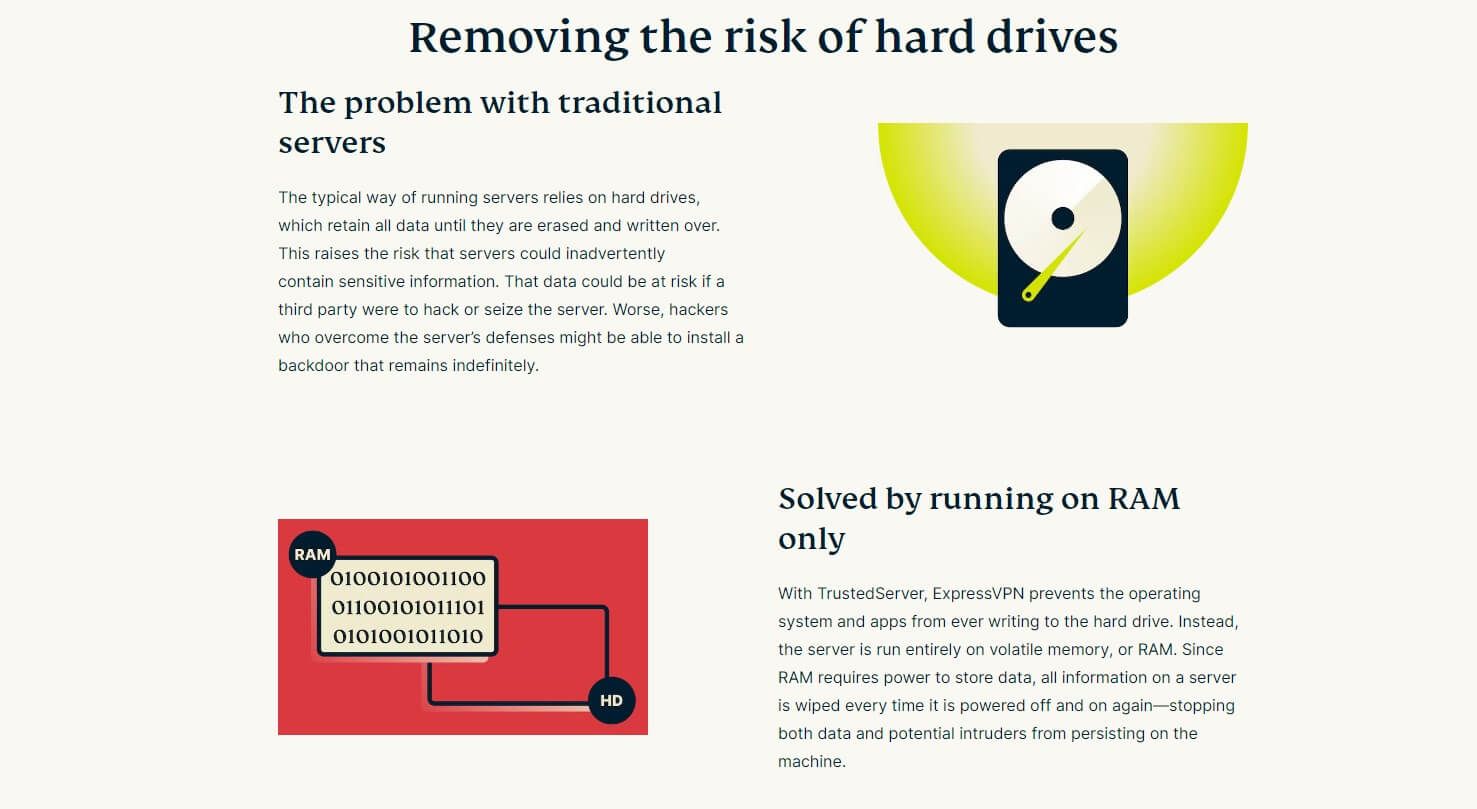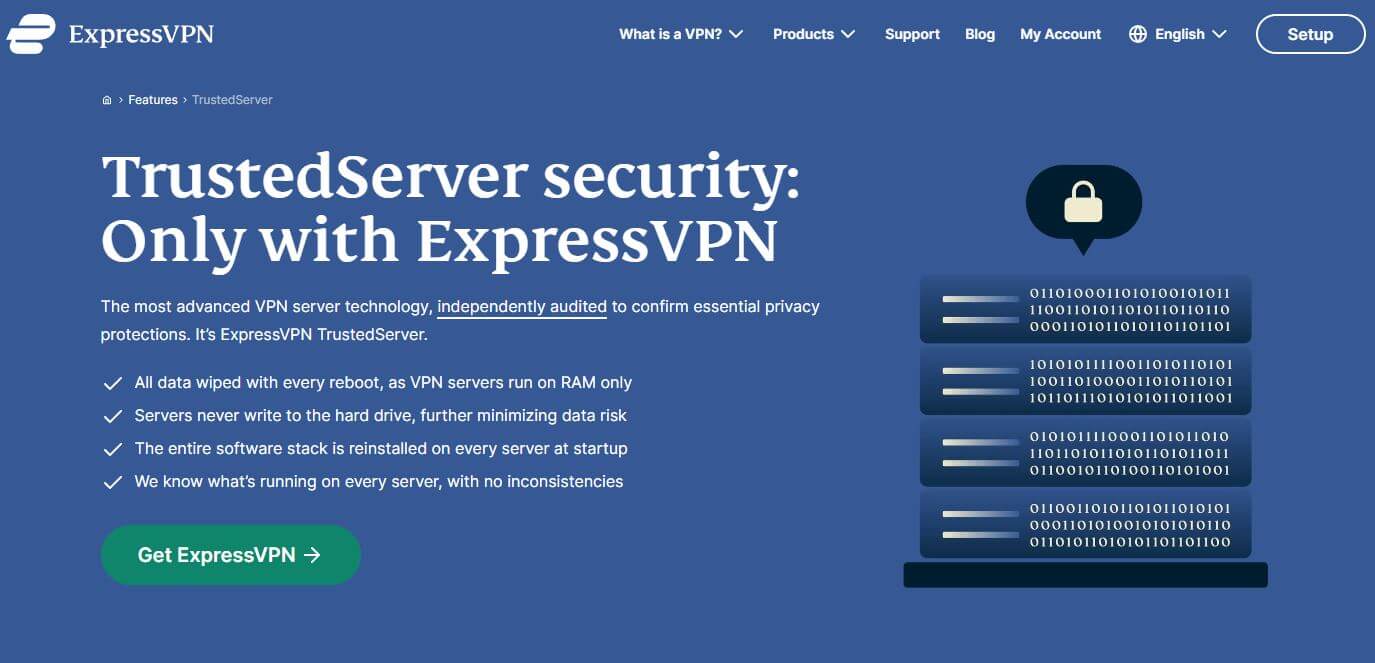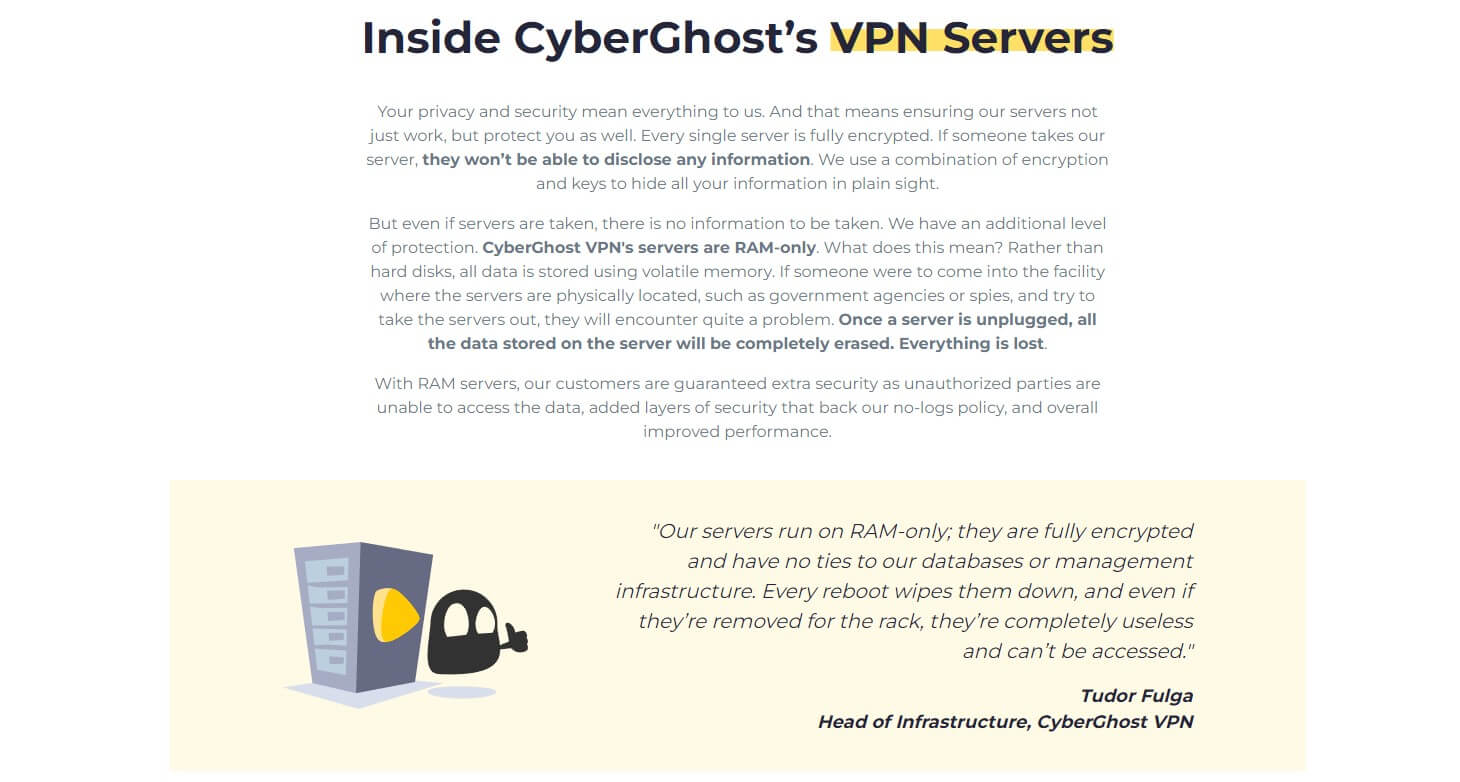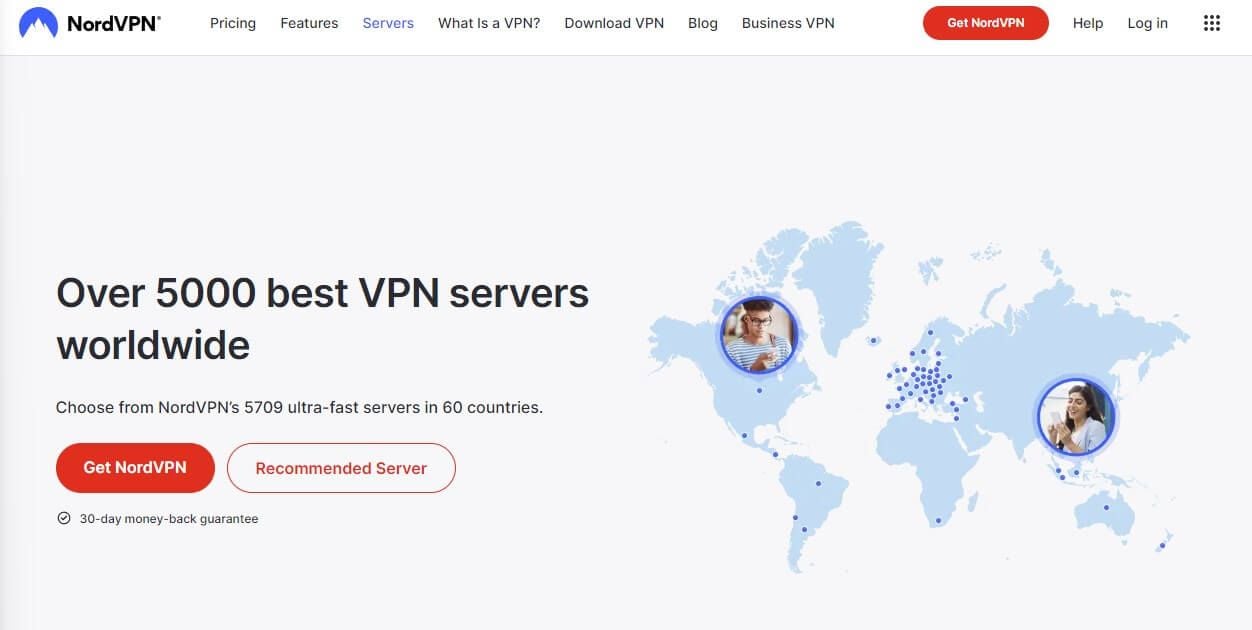Explaining a VPN’s security often involves encryption, a kill switch, IP leak protection, and modern security protocols. However, many people seem to overlook RAM-based VPN servers, which, coincidentally, are one of the best features a provider can offer.
RAM-only VPN servers are extremely vital for ensuring the highest level of security. They also work in conjunction with a no-logs policy because the infrastructure doesn’t allow any information to be stored on them. But what exactly are RAM-based VPN servers?
And – another better question – what are the best providers with this feature? In today’s article, we’ll go through an in-depth explanation of everything we mention. We’ll see what this feature is, how it works, and why it’s so important. Of course, we won’t forget to talk about VPNs with RAM-based servers either!
RAM-Based VPN Servers Explained
Before we talk about this type of server, let’s quickly glance over to “traditional” servers. You see, long before these servers made their astounding arrival, VPNs used servers based on traditional HDDs (hard-disk drives). They were functional and worked well, with one BIG problem.
Hard disks store data and the only way to delete this data is to wipe the disk manually. This brought into question just how many sensitive bits of information could be accidentally stored. And what if the provider is compromised by a hacker or group of hackers?
This could inevitably result in sensitive information ending in the wrong hands, destroying the privacy of millions of users. Not only that but when they breach the servers, hackers can easily install a backdoor that allows them to access the server at any moment.
No doubt, these are some serious problems that many of the best VPN providers faced before. However, the solution came in the form of RAM-based VPN servers that solved all of the issues.
How Do RAM-Based VPN Servers Work?
To explain how these servers work, we first need to make a parallel between HDD and Random Access Memory (RAM). HDDs store information permanently until the user deletes it or the HDD itself gets corrupted. Even when the HDD is turned off and booted up again, the information remains.
RAM is a volatile type of memory and works quite differently. It’s faster, easier to write to, but it stores information temporarily, which is a crucial difference. With each restart, RAM loses all information, and when it’s turned on, it starts storing new information again.
Each turn-off means all information is wiped, starting with a clean slate next time. Now, VPN servers based on RAM work the same. With each server restart, all data is wiped clean, which prevents unnecessary and unwanted information storage that could compromise your privacy.
With HDD-based servers, the provider had to manually delete this information to prevent hackers and snoopers from accessing it. Not to mention that HDDs are significantly slower, which meant performing updates and maintenance was significantly harder.
This makes RAM-only VPN servers superior and a revolutionary feature that improved both the security and privacy of VPNs by quite a significant margin.
RAM-Based Servers Advantages Over HDD Servers
In this part of our in-depth explanation of RAM-based servers, we’ll go over some of the key advantages, just to ensure you fully understand why they’re so important.
Increased Security
As stated, using RAM-only servers ensures heightened security, which is one of the main benefits. HDDs are prone to hacking, as hackers can install a backdoor and compromise user-related information easier. Not only that but the server itself can be accessed by physically getting in touch with it.
Let’s say the authorities seize the server for any reason. In this case, they can read all of its data, both related to the company and its users. RAM-only servers have one big advantage, as a backdoor can’t be installed, which prevents hackers from stealing private encryption keys and other information.

These servers, upon each restart, have a small read-only image that loads at the same moment. Once the server boots up, this image is loaded, containing the latest OS version and all other required prerequisites to work properly. This way, the servers are kept up to date all the time.
When using traditional HDD servers, administrators had to install the OS and then install updates over time for each server. With each update, the space for differences between the servers was larger, which meant not every server was using the same software.
As a result, it was harder to keep track of every server and make sure all of them are properly secured. As you can see, RAM-only servers fix this issue, making the maintenance and update process simpler. Not to mention that the read-only image with the latest software/OS is signed cryptographically.
So even if the server is seized, this image can’t be compromised. Plus, server restart can be done remotely, when the provider chooses to initiate it. For example, if the server is seized and compromised physically, the provider can restart the server even if it’s away from the company.
This way, all data is wiped clean remotely, so nothing can be extracted.
A Higher Level of Privacy
Needless to say, this type of server is much better for privacy.
When the provider restarts the server, which takes only a few minutes or less, all data suddenly disappears. With the no-logs policy that these VPNs offer, it’s only another surefire way of keeping hackers and snoopers away from your data.
Faster Speeds
RAM is always going to be faster than HDDs, no matter how great a particular HDD is. That said, RAM VPN servers are going to perform better both speed-wise and in terms of stability. Also, installing updates and performing maintenance is simpler.
In the case of an update, the provider just needs to create an update to the system, make a new image, and load it when the server boots. No need to go for incremental updates to each server, as is the case with HDD servers, so everything is flowing smoothly.
A Disadvantage of RAM-Only Servers: Expensive Price
One disadvantage of RAM-only servers is that they’re more expensive than HDD servers. Once again, RAM is significantly more expensive than HDDs even when talking about our desktop computers. For instance, 16 GB of DDR5 RAM can cost you around $40 or more, depending on the brand.
But when you want to buy an HDD for the same amount of money, you’ll be getting 1 TB of space. This translates to RAM-only servers, that end up being far more expensive at first. However, this update improves the VPN in many ways, so it ends up being beneficial for both the VPN and end users.
That’s why you’ll often find RAM-only servers in premium VPN providers. Free services often tend to not mention this feature because they don’t offer it. And let’s admit it – in 2025, no one wants to brag about having outdated, insecure, and slow HDD servers!
Besides, the price of these servers is up to the VPN providers to figure out. It’s not affecting you in any way, especially because VPNs with these servers aren’t very expensive either. That said, for you, as a user, these servers have absolutely NO downsides – just the aforementioned benefits.
Best VPNs With RAM-Only Servers: Our Top 3 Choices
Okay, so now that you know how important this feature is, we think you’re left with one more question. Where can I find these awesome RAM VPN servers? You can find them in premium providers, but not just any provider. Take a look at these 3, as they’re the best services with this feature.
3000 servers
105 covered countries
30 days money-back guarantee
8 simultaneous connections
9.4 /10
12000 servers
100 covered countries
45 days money-back guarantee
7 simultaneous connections
9.2 /10
7492 servers
150 covered countries
30 days money-back guarantee
10 simultaneous connections
9.8 /10
1. ExpressVPN

ExpressVPN and its TrustedServer technology are a well-known combination. This provider has been among the first companies to include RAM-only VPN servers, with several independent audits to confirm their quality. We’re talking about companies like PwC, KPMG, and Cure53.
On top of that, ExpressVPN backs up its awesome servers by the size of the server fleet. All of its 3,000 servers take advantage of RAM, which means you’re completely safe and secure no matter which one you choose. Another perk lies in its rock-solid security.
The provider uses AES-256 encryption, which is super useful in conjunction with a kill switch, split tunneling, and superb IP/DNS leak prevention. To this, we should add its modern Lightway protocol, which not only enhances security but also makes the performance impressive.
Users who enjoy ExpressVPN often use it for streaming or torrenting, for example, which is why it’s so popular. ExpressVPN’s ability to unblock Netflix libraries is remarkable, and so is its full Tor over VPN support for going on the dark web in complete privacy.
ExpressVPN’s ease of use is another awesome thing about it. The provider has identical apps for all devices, meaning that users on Windows, iOS, Android, Linux, and macOS will get the same treatment. Even better – there’s 24/7 live chat support in case you need any help.
All of ExpressVPN’s features are available in an affordable package that comes with a 49% discount and 3 free months for the 12-month plan. If you wish to test this RAM-only VPN for free, there’s a 30-day refund policy with no conditions. Don’t hesitate – check it out now!
To learn more, check out our ExpressVPN review.
Get the Fastest RAM-Only Servers With ExpressVPN
Pros
- Audits by Cure53, KPMG, and PwC
- AES-256 encryption
- Lightway & OpenVPN protocols
- 3,000+ servers in 160 locations
- Reliable streaming/torrenting
- 3 free months for the 12-month plan
Cons
- It’s not as affordable as CyberGhost and NordVPN
2. CyberGhost

CyberGhost is a cheaper VPN service, which, at first, implies it’s not using RAM-based servers. But don’t be fooled – this is an extremely capable VPN with 9,500+ RAM-only servers in 91 countries. In fact, it’s also blazing-fast, packing 10+ Gbps servers for the best possible performance.
Let’s not forget about its stringent no-logs policy either. It’s based in Romania, which allows it to adhere to the no-logs policy in question. On top of that, the service has an audit from Deloitte. This company confirmed everything the provider states regarding its privacy and security.
Aside from an automatic kill switch, CyberGhost comes with an impeccable ad blocker. Furthermore, you’ll enjoy WireGuard to boost your speeds, while split tunneling and DNS leak prevention will add more variety. CyberGhost’s streaming/torrenting servers are par excellence.
They’re optimized for these activities, allowing both of them to be fast and secure. In its Windows/macOS app, you’ll find even NoSpy servers. These servers are in Romania, under direct ownership of CyberGhost, which serves as an additional security measure.
Additionally, CyberGhost offers a proprietary DNS server for handling your DNS requests. Thanks to it, you can enjoy complete privacy as you go online and do anything you want. Speaking of Private DNS, there’s also SmartDNS, which you can use for streaming on any device.
Let’s finally mention its 7 simultaneous connections and 24/7 live chat service that works non-stop for you. Price-wise, CyberGhost is really cheap – approximately 3 times cheaper than ExpressVPN. Factoring in a 45-day refund policy and we can see why it’s so popular and has millions of users.
For more information, take a look at our CyberGhost review.
Enjoy CyberGhost’s RAM-Based Servers
Pros
- Very cheap prices
- 9,500+ RAM-only servers
- Private DNS
- No-logging policy
- 7 simultaneous connections
- WireGuard VPN protocol
Cons
- It offers no obfuscation
3. NordVPN

Last but not least, NordVPN is another VPN with RAM-only servers. This provider boasts about its impenetrable security and in reality, every claim is true. RAM VPN servers aside, NordVPN packs 5,500+ of them in 60 countries, resulting in an impressive fleet.
Not only that! NordVPN also has Double VPN servers, which can double your encryption and make you two times safer on the internet. The provider comes with Threat Protection as well, a feature for eliminating ads, malware, and viruses. You don’t get that in any other VPN on this list!
Being so popular, NordVPN is offering a no-logging policy to complement its cutting-edge servers. Audited by Deloitte and PwC, you can rest assured NordVPN won’t store any personal data. Its AES-256 encryption does a phenomenal job of protecting your online identity too!
And if you look closer, you’ll see that it also has a kill switch, with the addition of split tunneling, SOCKS5 proxy, and even an optional dedicated IP. Thanks to its P2P servers, users can download torrents and use the VPN legally for this purpose in any country.
Plus, its streaming capabilities are surprisingly good, as it can unblock dozens of Netflix catalogs. NordVPN’s performance is excellent thanks to 10 Gbps servers and NordLynx. You can also find obfuscated servers in its app, serving as a reliable anti-censorship measure.
NordVPN is stuffed with excellent features, so much so that we can’t mention them all here. However, you can use the button below to find out more about NordVPN and its special deal through our site. Don’t worry – you’ll also get a 30-day money-back guarantee, so you can test it without any risks.
Check our NordVPN review to learn more.
Try Out RAM VPN Servers With NordVPN
Pros
- It includes a free antivirus
- P2P servers are great for torrenting
- Obfuscated servers
- Fast speeds (10+ Gbps servers)
- Double VPN
Cons
- Rare connection issues on Windows
- Expensive dedicated IP addresses
Summary
Having said everything, we think it’s safe to say that VPN providers with RAM based servers are superior to those who use HDDs. With Random Access Memory, providers can ensure your private information safety, as these servers erase all data with each loss of power and restart.
Compared to traditional HDD servers, RAM VPN servers are truly revolutionary. For this reason, you can’t find them in every provider. In fact, only the top providers use it, as is the case with ExpressVPN, CyberGhost, and NordVPN.
With these three, you can’t go wrong, even if this isn’t your only criterion. These providers offer no-logs policies, bank-grade encryption, unlimited traffic, streaming/torrenting capabilities, and so much more. And since all of them come with special discounts, we think it’s the right moment to get one.
Use the buttons in this article to plunge yourself into the world of true privacy and security. Forget about those HDD VPN servers – they’re obsolete at this point.
FAQ
In this section, we’ll answer a few more questions about this type of server.
Are RAM-based servers present in all VPNs?
Unfortunately, no. This is yet to become an industry standard, especially when talking about cheaper providers. At the moment, ExpressVPN, CyberGhost, and NordVPN offer the best servers, with Surfshark and Private Internet Access as solid alternatives.
For example, Atlas VPN, a premium service, isn’t using RAM servers yet. There are plenty of other examples of premium services not including it, so be careful when you’re choosing one. Or simply select a provider from our list and you can be sure you’re enjoying these servers.
Can I find RAM VPN servers in free providers?
No. RAM is very expensive and ensuring lots of memory for each server will cost thousands, if not millions of dollars, depending on the size of the network. Free services don’t earn enough revenue to take this step, so they mostly stick to encrypted hard drives.
How can I know if the provider offers RAM-only servers?
Well, you can know it by reading the provider’s features on the site. If there’s no mention of these servers, in 99% of the cases, it means the provider isn’t offering them. As we said, no one will brag about HDD servers in 2025, but when using RAM instead, providers won’t miss a chance to boast about it.